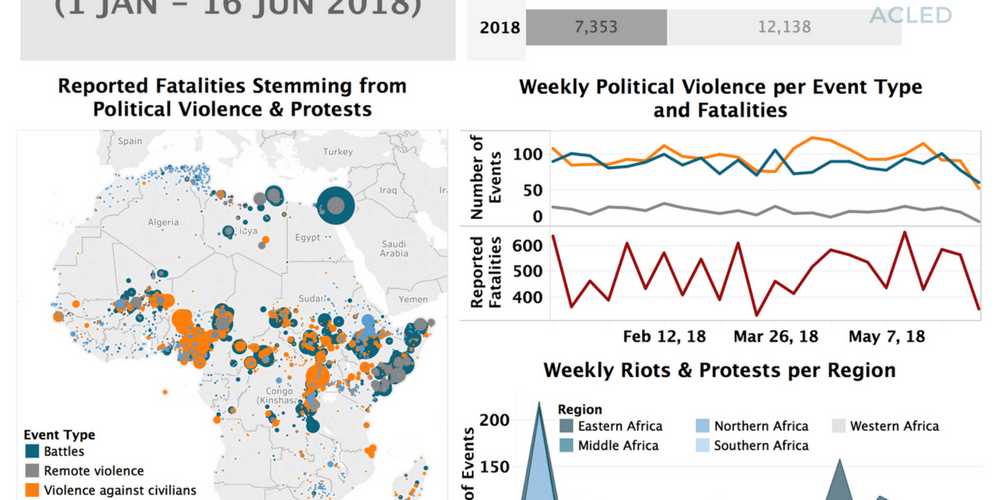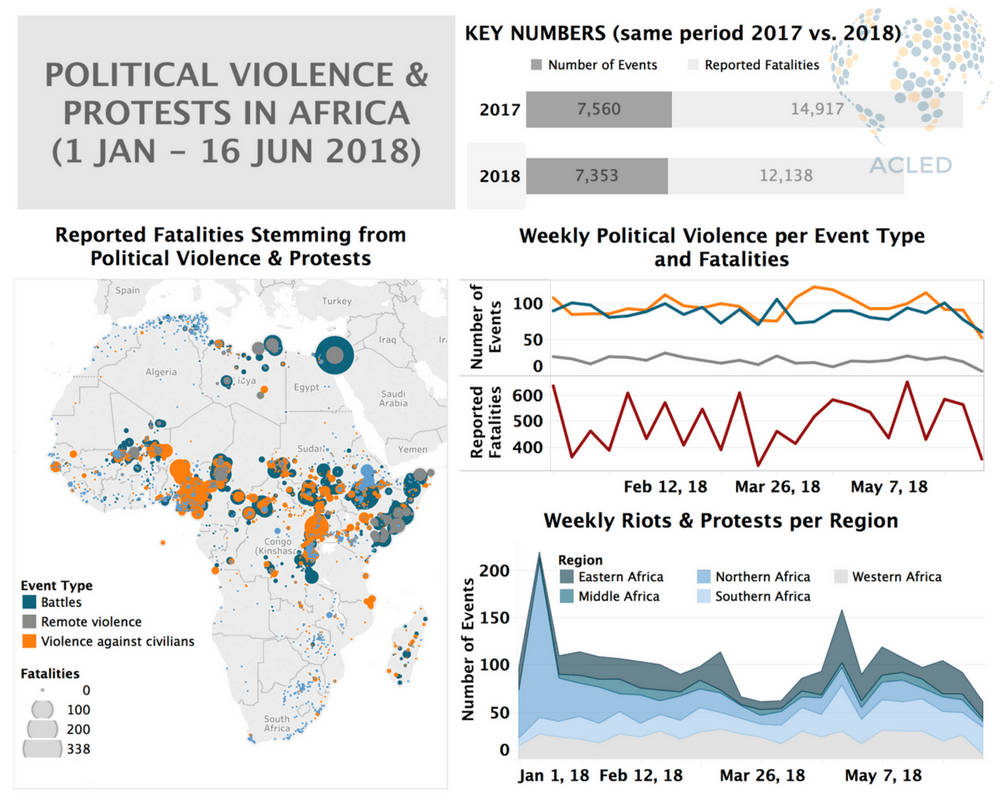Key developments in Africa on the week of June 10th include the prevailing tensions in CAR, the spread of ethnic violence in Ethiopia, the insurgencies in the Sudans, and the political disorder in Uganda and Zimbabwe.
In the Central African Republic (CAR), efforts to tackle insecurity in areas dominated by armed groups were reinforced last week as state forces started to be redeployed to Bangassou in Mbomou. However, these efforts were frustrated by an alleged attack on the Bangassou convoy at Bambari in Ouaka by elements of the Union for Peace in the Central African Republic (UPC) on June 10th. Clashes continued through the next day, leaving five UPC members killed. In a second incident in Bambari on June 10th, a MINUSCA peacekeeper died and another was severely injured when they came under attack by unknown armed elements between the town centre and the airfield.
In Ethiopia, tensions further increased in different areas of the country on the week of June 10th. In the Guji zone in southern Ethiopia, violence between the Guji and Gedeo groups continued unabated, with reports of over 200 people killed and 300,000 displaced in the most recent wave of violence that started on June 4th. In the Southern Nations, Nationalities and Peoples Region (SNNPR), tensions rose between ethnic groups who, although at odds over territory or administration issues, had seldom fought in the past. The Gurage and Kebena groups clashed in Welkite town between June 12th-15th. Around the same time, in Hawassa and Sodo, a cultural celebration ended in prolonged clashes between the Wolayeta and Sidama groups. In Oromia’s Chinaksen, the paramilitary Somali Liyu police was particularly violent, killing 14 Oromo citizens. The violence carried out by the force over the past few months has prompted groups like Amnesty International last week to call on the new administration to disband it.
In Sudan, heavy clashes occurred between government forces – including the Rapid Support Forces (RSF) and the Sudan Liberation Army – Abdul Wahid al-Nur faction (SLA-AW) over June 12th-14th in southern areas of Jebel Marrah in Darfur. Clashes have occurred between these parties since early March. SLA-AW claimed that over 100 were killed in the violence and that the RSF burned down villages in the area following their defeat. In South Sudan, clashes occurred around June 13th in the Bazia area of Wau, Western Bahr el Ghazal, between the government and the Sudanese Peoples Liberation Army-In Opposition (SPLA-IO). Military troops were said to have been moved to the area one month prior, while clashes between the two parties had not been reported in Wau since the end of January. The SPLA-IO accused the state forces of looting and burning down rebel-held villages in the area following the clashes. The clashes came amidst potentially destabilising moves, including the government’s ongoing important military reshuffles and the rival efforts carried out by neighbouring Sudan and Ethiopia to advance the peace process.
There were several other significant developments. In Uganda, tensions have been running high over a spate of murders and kidnappings over which the ruling National Resistance Movement (NRM) and the opposition Forum for Democratic Change (FDC) have traded blame. The apparent assassination of NRM lawyer Abiriga and his brother in Kampala on June 8th led to riots in their home constituency in Arua, with residents asking if the government is still able to guarantee their safety. President Museveni blamed the opposition and launched a series of measures to restrict them. A number of high-profile arrests were already made last week, such as former police chief Kayihura and opposition MP Nambooze; new regulations on boda drivers – part of an informal community policing structure loyal to Kayihura – were also announced. In Zimbabwe, inter-party tensions are persisting as the country approaches the July elections. In addition to attacking supporters of the opposition Movement for Democratic Change (Tsvangirai Faction) (MDC-T), supporters of the ruling Zimbabwe African National Union‐Patriotic Front (ZANU-PF) attacked defectors from the ruling party. On June 8th and 9th, there were two fatal incidents involving the child of a ZANU-PF supporter who defected to the National People’s Party (NPP) in Glendale (Mashonaland Central) and former ZANU-PF supporters now in the National Patriotic Front (NPF) in Kwekwe (Midlands).
Further north, in Nigeria, state forces continued their operations to clear Boko Haram from the Lake Chad region in conjunction with Cameroonian troops. At the same time, Boko Haram militants led multiple suicide attacks in Maiduguri targeting police and officers from the Civilian Joint Task Force. And in Libya, militiamen led by Ibrahim Jadhran attacked the oil basin in central Libya and took control of the oil port of Sidra and Ras Lanuf following clashes with the Libyan forces.







